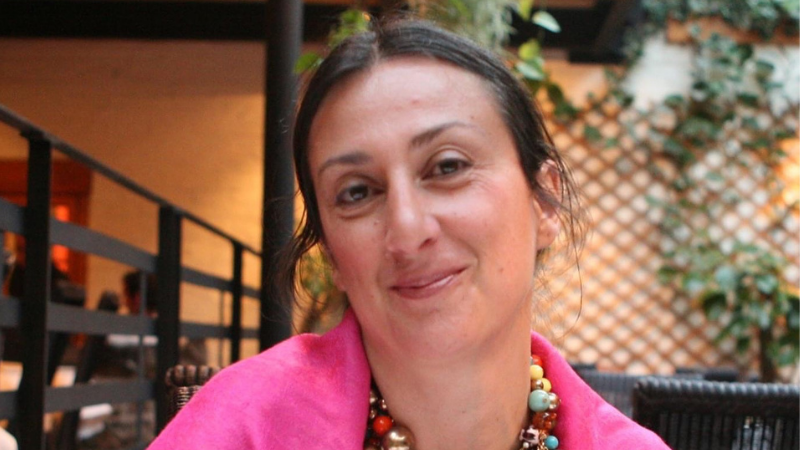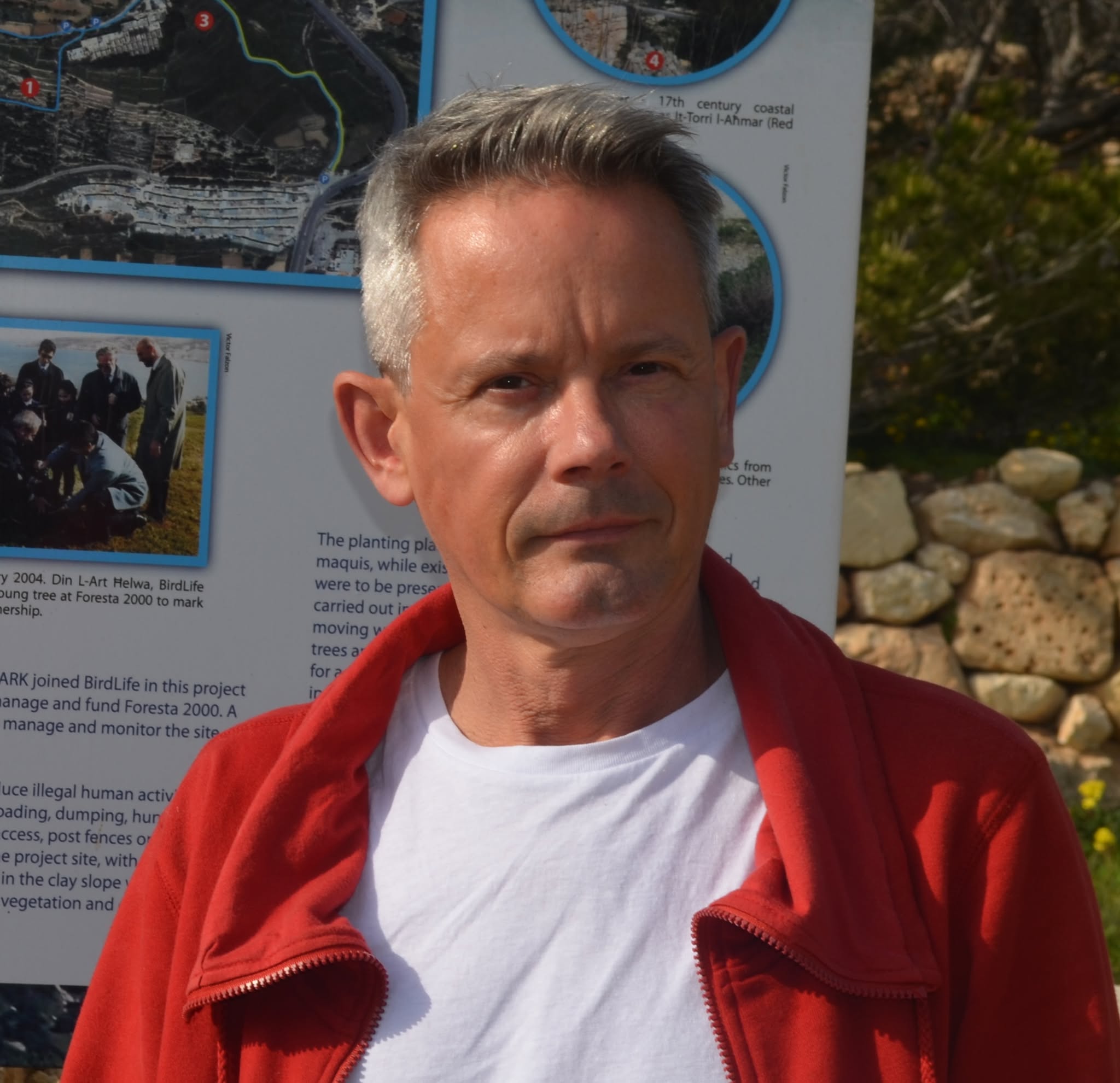On 16 October 2017, around 16:15, I was lying on my bed watching the sunlight filter through the blinds and dance across the ceiling. Drifting in and out of sleep, the outside world seemed tranquil and oblivious to the impending turbulence that would soon rouse me.
Suddenly, my phone sprang to life with vibrations and lights, clamouring for my attention. I reached down, swiped my thumb across the screen, and opened the first notification.
“They got her… Daphne is gone.”
A few minutes earlier, Daphne Caruana Galizia, Malta’s most formidable journalist, a mother, sister, wife, incredible writer, and the reason I became a journalist, had been killed. But not just killed – a car bomb detonated under her car, extinguishing one of Malta’s brightest lights.
Barely an hour before I received that message, Daphne had published her final blog post, the closing lines of which still haunt many of us today: “There are crooks everywhere you look now. The situation is desperate.”
These words would not only be her last but also serve as a reminder and call to action for those fighting for justice and against those we know had a hand in her assassination but are yet to face justice.
After pressing publish, she headed to her bank to discuss her frozen accounts – an act of sabotage inflicted on her by a politician. Unaware of the peril concealed beneath the passenger seat of her rental car, within moments of leaving her home, the bomb exploded. It enveloped her in flames and launched the vehicle into a nearby field.
Daphne Caruana Galizia emerged as a force for truth, strength, perseverance and uncompromising journalism, unearthing countless scandals that reached deep into the core of the Maltese government.
Daphne embodied fearlessness, serving as a source of inspiration for current and future journalists, myself included.
I might never have summoned the courage to leave my legal career without her influence. While I knew I could never fully emulate Daphne, I admired every word she wrote and hoped that by reading them, I would absorb them and even a single ounce of her skill.
But most of all, I marvelled at her resilience in the face of the fallout from her exposés. When my writing came under attack, both within the same newspaper, she contributed to and in other media I have worked for, I thought of her and persisted.
Her murder left an irreplaceable void in my life, and, for a time, I considered abandoning journalism altogether.
A relentless journalist
Daphne Caruana Galizia was a brilliant journalist who relentlessly unearthed countless scandals, demanding unwavering accountability from those mired in corruption.
She was immensely popular but also endured verbal attacks, online trolling, an arson attempt on her home, the brutal murder of her beloved dogs, death threats and numerous libel cases. At the time of her assassination, over 40 vexatious defamation cases were pending against her, most instigated by disgruntled politicians and officials whose corrupt dealings had been exposed.
The Labour Party and its supporters embarked on a campaign to vilify Daphne, using private Facebook groups to orchestrate hate-filled tirades against her and coordinate seemingly ‘organic’ attacks.
Shockingly, members of these groups included the disgraced former prime minister, Joseph Muscat, and the president and senior cabinet members.
The ongoing saga
Following her assassination, the wheels of justice turned agonisingly slowly. Without the efforts of the Parliamentary Assembly of the Council of Europe, led by rapporteur Pieter Omtzigt, an international legal team representing Daphne’s family, and local and international civil society, the investigation might have faltered after the arrest of two assassins in December 2017.
Initially, disgraced former prime minister Joseph Muscat adamantly resisted initiating a public inquiry into the circumstances surrounding the assassination and the potential failures of the state in preventing it. However, mounting international pressure compelled the state to relent in September 2019.
The 2021 inquiry concluded that the state should bear responsibility for Daphne’s murder. It highlighted a culture of impunity that left her isolated, harassed, and ultimately a target for assassination. The inquiry also spotlighted the police’s failure to protect her during her lifetime and their numerous lapses in investigating her murder.
Despite these damning findings, can we really say that everyone implicated in the inquiry has been held to account?
In the interim, mass protests in late 2019, fueled by Daphne’s murder and the corruption it laid bare, prompted Muscat to step down, and local business Yorgen Fenech faces trial on charges of alleged complicity in the brutal killing.
Fenech also had connections to 17 Black, a covert offshore company implicated in money laundering, and held the position of CEO at Tumas Group, both companies with links to Daphne’s investigations.
The prevailing sentiment among those who knew, admired, and continue to fight for Daphne is that justice may remain elusive. The rot runs deep, and those possibly complicit in planning her murder will go to great lengths to keep the truth concealed.
The stinking rot remains
Even more distressing is that, six years later, nothing seems to have changed.
Since I have been back at The Shift, the stories I have covered have shocked me. Driving licence rackets, medical fraud, countless planning and construction illegalities, severe conflicts of interest, indisputable nepotism costing the taxpayer millions, employment fraud, and perjury, to name but a few.
But what disappoints me the most is not that the same dodgy schemes and scams continue, albeit with a few new faces, but that the situation for journalists is getting worse.
Behind the scenes, what the public does not see is the exclusion of some media platforms, the slandering, the concerted efforts to undermine and delegitimise, the stranglehold on funding and advertising, targeted character assassinations, the threats – both legal and personal, the attacks in court and online, and the countless other ways they chip away at the resolve of those carrying on Daphne’s work.
When leaks occur from the government, witchhunts and threats are bestowed upon entire departments. Lawsuits in the scores are waged against media like The Shift, who ask for information owed to them under the law.
Media funded by the taxpayer uses slander to undermine the credibility of legitimate reporting, and those feeding in the public trough use their platform to elicit attacks on individual journalists.
The latest we have is the Justice Minister Jonathan Attard, the man supposed to oversee reform of laws to protect journalists and media freedom, attacking those he is supposed to be helping.
Launching a screeching attack on a radio show, he accused journalists of lying, having ulterior motives, and trying to “strangle the link between the people and the politician.” He drummed up hate and vitriol against those who reported on the apparent wrongdoing within his government.
This situation we find ourselves in today is even scarier than six years ago because after Daphne was murdered, a precedent was set. The fact that impunity reigns, full justice has not been served, and journalists remain unprotected means we risk a situation where a similar crime could be committed. This lack of action paves the way for someone to attack or kill a journalist in the belief the system is such that they will, quite simply, get away with murder,
The 16 October remains a day of pain for me and many others. Yet, it is also a day to reflect upon the indispensable role journalists play in upholding democracy and the smooth functioning of our societies.
It is a stark reminder that we must not drop the ball for even a second because we are all at risk until justice is served for Daphne.














“THE STINKING ROT REMAINS ” succinctly put, highlights just how putrid Abela and his “party” are. Labour in Malta are just as they’ve always been wanting easy money for nothing and run by a thuggish clique who wil be difficult to take down. Unfortunately there is no political, judicial,social hierarchy left that are free from corruption to even start bringing them down. A revolution will be required to stop ALL this but as always but, the Maltese will always take the easy way out and submit regardless
6 years ago, the political situation in Malta was already filthy to the bone, where many parasites took advantage of utter impunity to misappropriate publc funds, whilst others remained busy to oppress those who stood tall in front of wrongdoings. As a general rule the Mafia gang continued expanding, and the manipulative tactics continued to refine to take better advantage of the ignorant and in large part of the innocent facit of the Maltese society. So, 6 years down the line, just try to imagine the democratic deficit and the perilous situation we are in right now!! No words to describe this unprecedented climate of criminality we are all enduring because this situation has been created and supported from those sitting at the very top. Needless to say that we are living dangerous times.
Honest citizens of this country should really be thankful to the team behind Repubblika for continuing the work that Daphne Caruana Galizia started. In their stories , they don’t just give us surface- level facts but they uncover hidden details and exposing truth.
We owe you so much.
“The scene is set for another assassination”. Not of another journalist but of one rat eliminating another, I reckon !
A lovely article headlined with a really good photo.Thank you.
This article highlights the EUs toothless stance and blah blah approach in rule of law. It strengthens my skepticism in the institution, and in its entire pathetic gravy-train management structure. Thank you for confirming.
The EU only cares about the Rule of Law when a Member State stops taking in illegal immigrants. That is still the choice of sovereign states. But when a Member State churns out daily scandals, fraud and institutionalized corruption, Brussels’ only reaction is a deafening silence.